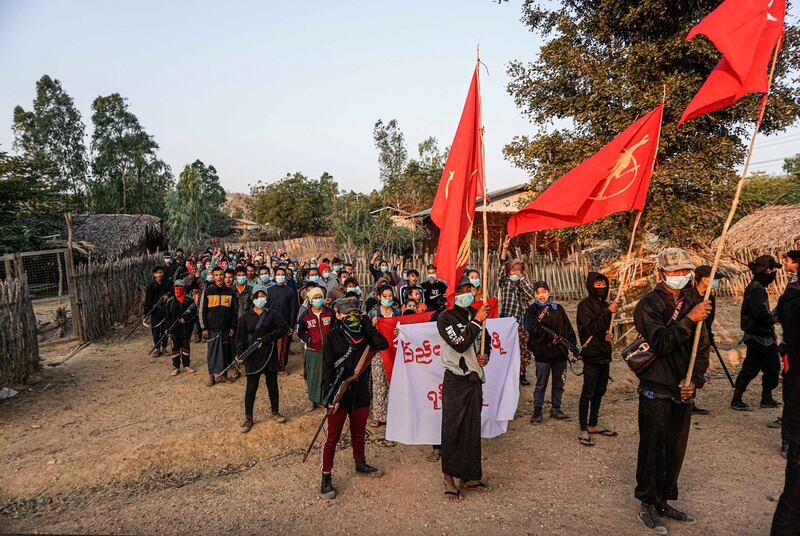More than 170 anti-junta paramilitary groups from Myanmar’s northern, embattled Sagaing region have held talks to deepen cooperation in their fight against the military and share strategies for administering areas under their control.
The “Sagaing Forum,” hosted online on May 30-31, provides a rare glimpse into the myriad of so-called People’s Defense Force, or PDF, groups that are fighting the junta but have not pledged allegiance to the shadow National Unity Government seeking to reestablish a civilian administration in the aftermath of the military’s Feb. 1, 2021, coup d’etat.
Speaking to RFA Burmese on Friday, Sagaing Forum spokesperson Chaw Su San called the gathering part of efforts to “strengthen the revolutionary forces” of the region, despite the absence of NUG-aligned PDFs.
“More than two years into the resistance against the military junta, we held the forum as we saw the need to unite all revolutionary groups, in order to keep up the momentum of the revolution,” he said.
“The purpose of the forum is to make the anti-junta revolutionary groups in Sagaing more connected so that they will be able to continue fighting against the junta as part of a wider network,” he said.
Chaw Su San said that topics at the forum focused on regional issues related to politics, the military and regional administration. A statement issued by forum organizers on June 1 said other themes included ending military rule, self-governance, self-administration and the organization of regional anti-junta forces.
While NUG-aligned PDF groups were absent from the forum, the shadow government sent a message to the forum at its conclusion, expressing hope that the talks could foster progress on issues related to local needs, “without unwanted external pressures.”
The National Unity Consultative Council – an advisory body to the NUG made up of various ethnic armed organizations and majority Bamar groups – was present and delivered a speech to attendees.
Captain Htut Khaung, the leader of the Yinmarbin township 28th Battalion of the Dar Ma Saing Army under the NUG, told RFA that he did not receive an invitation to the forum, but was briefed on the topics covered.
“The forum attendees pledged to continue the revolution as a united front and they discussed their goals, including what they want and how they will carry it out,” he said.
A person who attended the forum as an observer confirmed to RFA on condition of anonymity that he did not see PDF groups under the NUG’s Ministry of Defense in attendance.
NUG rival?
Critics of the forum have suggested that the groups that attended intend to present an alternative to the NUG and gain political advantage.
However, forum spokespersons dismissed the allegations, calling it a “platform for all revolutionary groups to meet and confer.”
Thein Tun Oo, the executive director of the Thayninga Institute for Strategic Studies, which is made up of former military officers, said he viewed the gathering as a sign of disunity among anti-junta actors.
“It is natural that, after a time, groups with different directions and preferences part ways, leading to fragmentation,” he said. “We will have to wait and see if that is what’s happening, but it’s a possibility.”
Thein Tun Oo said it is “highly probable” that there will be further splits between the groups going forward, although he did not elaborate.

Kyaw Zaw, spokesman for the office of NUG President Duwa Lashi La, denied speculation that the shadow government’s absence was proof of a split within anti-junta forces and said the NUG supported the gathering.
“The people of Sagaing region and their revolutionary and political groups need to come together and discuss how to jointly implement a new federal democratic state in the Sagaing Forum,” he said, elaborating on the NUG statement sent last week.
Kyaw Zaw said that discussions at the forum pertaining to the right to self-determination and self-governance were “in line with the Federal Democratic Charter,” adding that the NUG was “satisfied” with the results of the meeting.
Local support
RFA spoke with residents of Sagaing who also welcomed the gathering, including a person from Pale township who said he hopes for additional meetings that promote unity between the region’s anti-junta groups.
“I welcome these forums as a citizen,” said the Pale resident, who spoke on condition of anonymity, citing security concerns. “My only hope is that they collaborate with scholars and other experts to ensure that they don’t go astray.”
Sagaing Forum organizers told RFA that the next gathering will allow participants to drill down on topics raised in May and said they plan to invite additional groups to increase participation.
A date has yet to be decided for the second forum.
Translated by Myo Min Aung. Edited by Joshua Lipes and Malcolm Foster.
